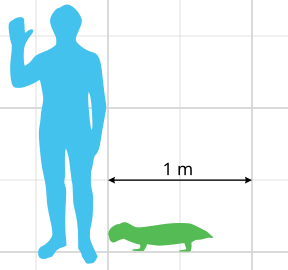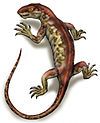Pristerodon
| Pristerodon Temporal range: Late Permian
| |
|---|---|

| |
| Skull at the Museum für Naturkunde, Berlin | |
| Scientific classification | |
| Domain: | Eukaryota |
| Kingdom: | Animalia |
| Phylum: | Chordata |
| Clade: | Synapsida |
| Clade: | Therapsida |
| Suborder: | †Anomodontia |
| Clade: | †Dicynodontia |
| Family: | †Eumantellidae |
| Genus: | †Pristerodon Huxley, 1868 |
| Type species | |
| †Pristerodon mackayi Huxley, 1868
| |
| Synonyms | |
| |
Pristerodon is an extinct genus of dicynodont therapsid from the Late Permian of South Africa, Zambia and India.
Paleobiology
[edit]Brain and senses
[edit]Pristerodon were among the earliest land animals able to hear airborne sound as opposed to hearing via ground vibrations. A South African specimen studied with neutron tomography[1] has shown evidence of an eardrum on its lower jaw with the implication that it was hearing impaired during the act of chewing. The specimen had a 3mm cavity for cochlea which transformed sound frequency ranges into nerve impulses sent on to the brain.
Ecology
[edit]Pristerodon has been found in the Kundaram Formation of India, Usili Formation of Tanzania, the Upper Madumabisa Mudstone Formation of Zambia, and the Teekloof Formation and Abrahamskraal Formation of South Africa.
Phylogeny
[edit]Pristerodon in a cladogram modified from Angielczyk and Rubidge (2010) showing the phylogenetic relationships of Dicynodontia:[2]
| Dicynodontia |
| |||||||||||||||||||||||||||||||||||||||
Gallery
[edit]-
Restoration of Pristerodon mackayi
-
Size of Pristerodon mackayi relative to a human
See also
[edit]References
[edit]- ^ Laaß, Michael (26 June 2015). "The origins of the cochlea and impedance matching hearing in synapsids" (PDF). Acta Palaeontologica Polonica. 60. doi:10.4202/app.00140.2014. Retrieved 14 July 2015.
- ^ Kenneth D. Angielczyk; Bruce S. Rubidge (2010). "A new pylaecephalid dicynodont (Therapsida, Anomodontia) from the Tapinocephalus Assemblage Zone, Karoo Basin, Middle Permian of South Africa". Journal of Vertebrate Paleontology. 30 (5): 1396–1409. Bibcode:2010JVPal..30.1396A. doi:10.1080/02724634.2010.501447. S2CID 129846697.
External links
[edit]








